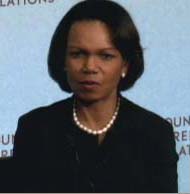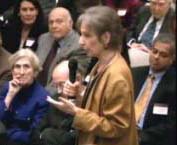By Lucy Komisar
Dec 6, 2010

George W. Bush Secretary of State Condoleezza Rice spoke at the Council on Foreign Relations Friday and used the occasion to attack WikiLeaks. I used the occasion — an HBO History Makers Series moderated by TV anchor Katie Couric– to ask her a question.
Her comments
COURIC: After 9/11, government agencies opened up the flow of information to foster better intelligence sharing. But that may have opened the government up —
RICE: Yeah.
COURIC: — to the kind of leaks that we’ve seen, or the kind of exposure we’ve seen from WikiLeaks. Fareed Zakaria just wrote a piece in Time where he said the leaks are in some ways an unintended consequence of Washington finally getting its information act together. So have the flood gates been opened too much? How do you find the proper balance?
RICE: Well, let me say first that I think what has happened is a crime. It’s up to the Justice Department to figure out exactly what crime it is. But it’s got to be prosecuted and punished, or it’s going to keep happening. And the — I hope that the penalty is really severe, because maybe that’ll deter this kind of behavior. The United States can’t exist in a world in which we can’t share information within the government, and with the — with the expectation that it’s going to somehow end up in — on the front pages of newspapers. You can’t do business that way. So I hope it’s prosecuted, and I hope it’s prosecuted severely.
Secondly, though, it did occur to me that probably the sharing, it looks, maybe has gone too far. And I know that Secretary Clinton and Secretary Gates are looking into this. The idea that somehow cables from our embassy in Germany are being read at the staff-sergeant level at our military bases seems to me rather odd. (Laughter.) And I think probably the flow of information has gotten a little — a little loose.
COURIC: Sloppy.
RICE: A little sloppy. The third thing is, you know, you really don’t have to write down everything you think. (Laughter.)
COURIC: (Laughs.) You save that for your diary.
RICE: Yeah. Some of the — some of the cables, I have to say, I thought — not the — not the analysis of circumstances and so forth, but some of the cables I thought to myself, You know, did you really need to write that down? (Laughter.)
COURIC: So do you think these leaks have been damaging, or just embarrassing?
RICE: No, I think they’ve been damaging. I think they’ve been damaging, because people will watch what they say to us. In some cases where — in, interestingly, some authoritarian countries, where people were saying one thing to their populations and to their parliaments, and another to us, it’s going to be not just embarrassing, but it could have real consequences.
COURIC: Consequences.
RICE: That’s right.
COURIC: So, for example, in Yemen.
RICE: Exactly. And so I think that’s a real problem. And for several of our diplomats, I think their relations with the countries and the leaders with whom they have to deal every day are irrevocably broken. So it’s done real damage.
My question (45:30 into the video)

QUESTIONER: I’m Lucy Komisar. I’m a journalist. Following up your comments about WikiLeaks, which you said should be criminally charged by the U.S., WikiLeaks and its founder considers itself a publisher, which in the new system of publishing on the Internet seems to be appropriate, and he calls himself an editor in chief dealing with editors and journalists around the world. Among them are the editors and journalists at — of The New York Times. So if WikiLeaks should be charged criminally for putting up this information, should The New York Times be charged criminally for doing the same thing?
RICE: Well, I — as I said, the Justice Department will have to determine what the legalities are here. I just hope they’re very, very actively determining exactly that.
WikiLeaks took purloined documents and spread them. Now, I have — may have my own views on whether or not legitimate newspapers should have taken up that task, but — and gone ahead and published them. But it was WikiLeaks that made them available, from whomever they got them.
If our laws don’t deal — and very often our laws are not capable of dealing with changed technological circumstances; I fully understand that — then somebody ought to look at the law and see how we can deal with these particular technological circumstances.
It cannot be the case that documents that belong to the United States and are classified by the United States of America and that if I walked up to you and handed you a classified document, I would be committing a crime — now, it cannot be that WikiLeaks handing to the entire world classified documents is not a crime.
But somebody should figure out — I’m not a lawyer, I’m not a Justice Department lawyer. But unless you find a way to punish that behavior, the United States of America is not going to be able to operate.
COURIC: How do you feel about major newspapers and websites publishing information —
RICE: I knew you were going to go there — (laughter) — after I said what I did.
COURIC: — if you do have a certain point of view about it?
RICE: I would have — I would have preferred that it — that it not be done. And I think there were requests that it not be done. But I understand that there’s a kind of irresistible urge or desire. Perhaps some would say that they believe it’s their responsibility to do so.
When I looked at what is there, I really wonder how much our debate as a democratic society has been enhanced by the publication of gossip about what one of our diplomats said about the president of this country or the prime minister of that country. I don’t — I don’t, frankly, see the public value.
COURIC: But are there — are there parts of it that might be useful? For example, when Arab nations express their concern over a nuclear Iran after Ahmadinejad sort of portrays himself as a friend of all Arabs, et cetera, et cetera, when we see real trepidation among some Arab states about it, could that actually be useful in our foreign policy?
RICE: I would have — rather have left it in the hands of President Obama and Secretary Clinton to decide whether or not that was useful or not. I don’t think that it is — and I think — I would have thought that it is not useful to have that exposed in the way that it was, and that it’s going to be a very long time before a lot of those people express anything to us. And that is a real problem.
As a side note, there’s a curious glitch later in the transcript, a comment by an unidentified woman (MS) that the transcriber couldn’t hear.
COURIC: Why do you think the intelligence was so off about that U.S. troops [in Iraq] would be greeted as liberators?
RICE: You know what? Actually, that’s not what U.S. intelligence said. And —
COURIC: But that’s what some pretty key officials like Dick Cheney said.
RICE: Some people thought — and, by the way, when the statue came down, there was a lot of greeting as liberators. Go back and look at those pictures of people pulling down Saddam Hussein’s statue.
MS. : (Off mic.)
RICE: No. I’m just saying at that particular moment in time you had people who were cheering American soldiers.
But, look, nobody did this on the basis of a belief that somehow Americans were going to be greeted as liberators. It was done on the basis, we believed, that Saddam Hussein was a threat, and you needed to deal with Saddam Hussein.
I think the question of why the intelligence on the weapons was not as good as it might have been, there a lot of decisions to change the way that intelligence is not so much collected, but analyzed, how competing views are dealt with, how those are communicated to the president, the whole creation of the DNI was meant to deal with that problem.
Who was MS.: (Off mic.)?
That was me, second-row center, declaring in a stage whisper, That was a fake! It’s been proved that a handful of Iraqis battered the statue with hammers, but it was a U.S. military vehicle that pulled it down.
Check Sourcewatch, which says: Toppling the statue of Saddam Hussein was a staged event, by U.S. soldiers, for the media. A Reuters long-shot of Firdos Square where the statue was located shows that the Square was nearly empty when Saddam was torn down. The Square was sealed off by the U.S. military. The 200 people milling about were U.S. Marines, international press and Iraqis. However, the media portrayed it as an event of the Iraqi people.
Why is Condoleezza Rice still lying about it?
And why is she attacking WikiLeaks for publishing confidential U.S. documents — calling for criminal prosecution — but not criticizing the New York Times for doing the same thing?
The lie about the statue ironically provides a reason why journalists and others want to see internal documents about U.S. government policy and actions. It’s because the U.S. government, on occasion, lies.


I am so glad people like Lucy challenge things.
Thank you Lucy for getting this information out for us to read.
We‘ll be seeing a lot of Condoleezza around this time. She‘s selling a book, was doing it on The View yesterday!
I would say toppling the statue counts as good propaganda.